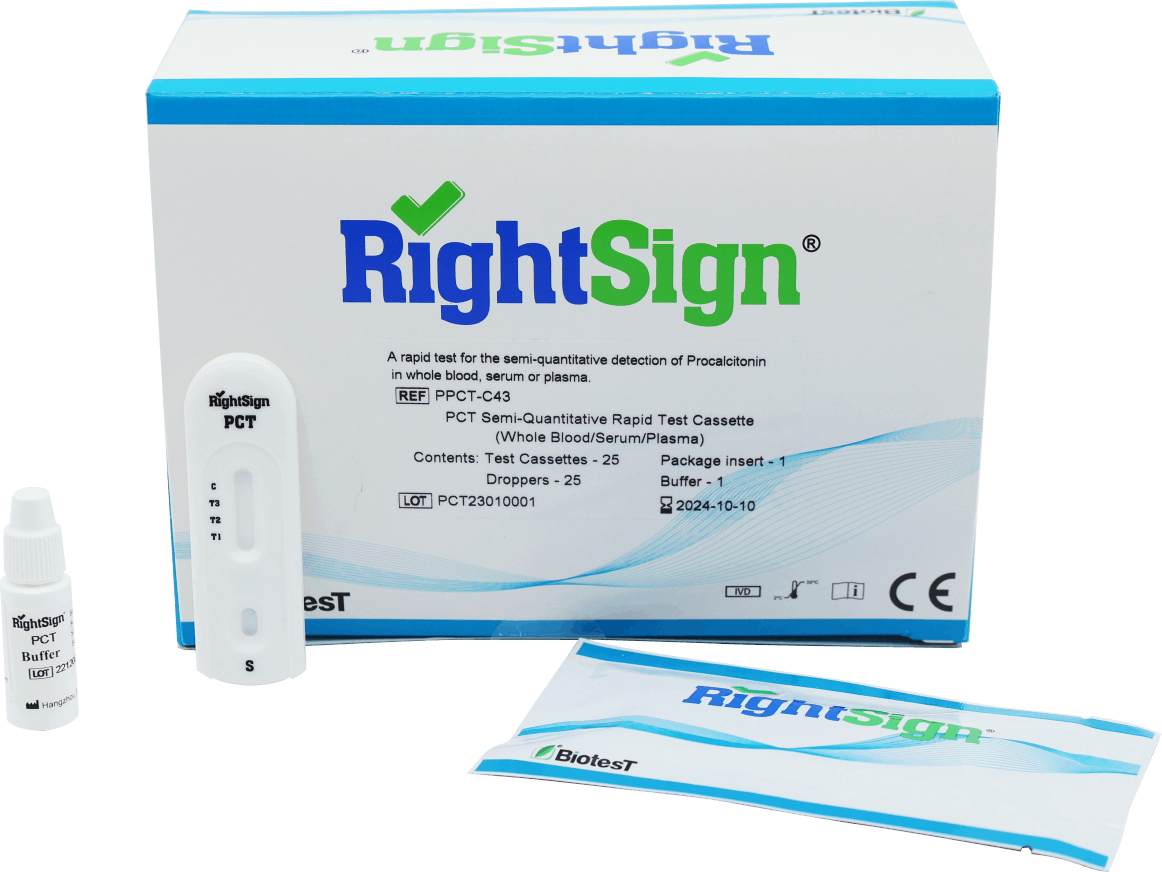PCT Semi-Quantitative Rapid Test Cassette-RightSign
52,25 €*
Available, delivery time 4 - 7 Working days
RightSign Procalcitonin (PCT) Semi-Quantitative Rapid Test Cassette
The RightSign PCT Rapid Test Cassette is a vital diagnostic device enabling swift determination of procalcitonin levels in patients suspected of having a serious bacterial infection. It is an indispensable tool for healthcare professionals in the intensive care setting, contributing to accurate and timely decision-making.
Procalcitonin (PCT) level determination is an integral part of managing infections, especially severe sepsis and septic shock. The RightSign PCT Test delivers reliable semi-quantitative results, facilitating the differentiation between bacterial and viral infections. This distinction is critical in guiding antibiotic use, allowing for a more targeted treatment approach and combating antibiotic resistance.
Medical professionals can now execute rapid and effective interventions in critical scenarios, such as severe systemic inflammation or suspected sepsis, thanks to the RightSign PCT Test's swift and accurate results. Trust in Odem for supplying your healthcare practice with a tool that not only aids in delivering optimal patient care but also contributes to the global effort in responsible antibiotic stewardship.
In conclusion, the RightSign PCT Test stands as a symbol of advancement in infection management, promising efficiency, precision, and cost-effectiveness. Adopt Odem's products to ensure that each patient benefits from the highest quality care in the fight against systemic bacterial infections.

Product Specifications
- Test Format: Cassette
- Sample Type: Blood
- Pack Size: 25 Test Cassettes per Box
- Storage: Room temperature or 4-30°C
- Shelf Life: Up to 12 months
- Certification: CE marked, for professional use
Benefits
- Speed: Quick results enhance urgent care capabilities.
- Precision: Semi-quantitative results for reliable procalcitonin level assessment.
- Ease of Use: Simplifies the testing process in any clinical setting.
- Affordability: Cost-effective, in line with Odem's commitment to affordable healthcare.
- Quality: Manufactured under strict EU standards, ensuring premium product integrity.
Technical Data
- Test Principle: Chromatographic immunoassay
- Detection Method: Semi-quantitative
- Test Duration: Results in minutes
- Sample Requirements: Whole blood, serum, or plasma
FAQ's about Rightsign procalcitonin test - (PCT Test)
What is the reference range for procalcitonin levels, and how are critically ill patients affected?
The reference range for procalcitonin levels is important, especially in critically ill patients, as deviations can indicate inflammatory responses.
How does the procalcitonin test aid in the diagnosis of urinary tract infections and pneumonia?
The procalcitonin test contributes to the diagnosis of urinary tract infections, pneumonia, and medullary thyroid carcinoma by detecting elevated PCT levels associated with bacterial infections.
Is the procalcitonin test suitable for use in the intensive care unit (ICU)?
Yes, the procalcitonin test is valuable in the ICU, providing insights into the patient's systemic response to bacterial infections.
How does the procalcitonin test contribute to the prognosis of patients with severe infections?
The procalcitonin test aids in assessing the prognosis of patients with severe infections, offering valuable information for effective medical management.
Can procalcitonin measurements be utilized in monitoring and managing patients with suspected sepsis?
Procalcitonin measurements are instrumental in monitoring and managing patients with suspected sepsis, guiding healthcare professionals in their treatment approach.
Is the procalcitonin test a reliable marker for bacterial sepsis, and how does it compare to other diagnostic methods?
The procalcitonin test is a reliable marker for bacterial sepsis, and its utility is often compared to other diagnostic methods to ensure accurate and comprehensive evaluations.
Can the PCT test be used to assess the risk of developing sepsis in patients with suspected infections?
Yes, the PCT test is useful in assessing the risk of developing sepsis in patients with suspected infections, aiding healthcare professionals in timely interventions.
What is the significance of baseline procalcitonin levels, and how are they monitored in patients at low risk for sepsis?
Baseline procalcitonin levels are significant, and monitoring them in low-risk patients provides a baseline for comparison and aids in identifying any deviations. Procalcitonin test is a blood test that measures the level of procalcitonin.
How does the PCT test act as a tool to guide healthcare professionals in the management of suspected sepsis cases?
The PCT test, or procalcitonin test, serves as a valuable tool, guiding healthcare professionals in the management of suspected sepsis cases by providing essential information for decision-making.
How is the Procalcitonin (PCT) test utilized as a diagnostic tool for assessing the progression to severe sepsis?
The PCT test is employed to evaluate the progression to severe sepsis by measuring procalcitonin levels, aiding in early identification and intervention.
How does the PCT test contribute to the diagnosis of sepsis, and what does low procalcitonin levels suggest?
The PCT test contributes to sepsis diagnosis, and low procalcitonin levels may suggest a lower risk of bacterial infection, helping in the diagnostic process.
Can you elaborate on the utility of procalcitonin monitoring and its role in assessing the severity of infections or sepsis?
Procalcitonin monitoring is valuable in assessing infection severity, particularly in sepsis cases, offering healthcare professionals insights into the patient's condition.
What is the connection between procalcitonin levels and the presence of blood clots or complications leading to sepsis?
Procalcitonin levels may be indicative of complications such as blood clots, offering a potential marker for healthcare professionals to anticipate and manage severe outcomes.
What does a PCT blood test involve, and how is it different from other routine blood tests like a complete blood count?
The PCT blood test involves measuring procalcitonin levels, which differs from routine blood tests such as a complete blood count, providing specific information related to infection.
In what ways does procalcitonin guidance impact the interpretation of test results, and how does it contribute to effective patient management?
Procalcitonin guidance plays a pivotal role in interpreting test results, contributing to effective patient management by offering insights into the severity of infections.
Login

